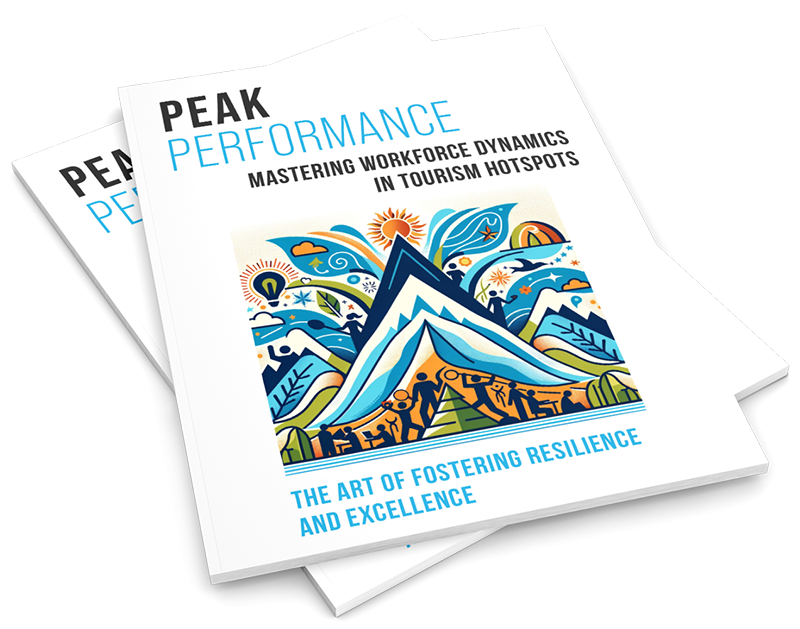Transforming Hospitality: Mastering Workforce Dynamics in Tourism Hotspots
Like many industries, in hospitality and especially in the bustling tourism hotspots every move counts.
I've been involved in the Private Equity/Venture Capital industry for over 35 years and have witnessed firsthand the seismic shifts and subtle nuances that define success. My journey began in the hospitality sector, and it's where my passion for refining and revolutionizing business models took root. Throughout the years, I've stayed intimately connected to the industry, shaping its future through investments, consulting, coaching and developing staff training programs.
My latest ebook, "Peak Performance - Mastering Workforce Dynamics in Tourism Hotspots" shares insights and strategies from my career adapted for today’s world. It’s more than a collection of concepts, it's a practical guide born from real-world experience and success. The focus is to provide you with actionable strategies that address the pressing challenge of labour shortages and workforce management in the hospitality industry.

Why is this important now? The hospitality sector is at a critical juncture. The way we manage our teams, the strategies we employ to attract and retain talent, and how we adapt to the ever-changing market demands will determine our place in the future of this industry. "Peak Performance" dives into these themes, offering a blueprint for action.
Recruitment isn’t about filling positions; it's about understanding the rhythms of your business, aligning your team's strengths with your operational needs, and creating an environment where excellence is the norm. From strategic talent acquisition to fostering resilience and excellence in your staff, the ebook covers the spectrum of challenges and solutions that you face daily.
In the hospitality industry, the workforce is the heartbeat of every successful establishment. However, the rhythm of this heartbeat varies greatly, especially in tourism hotspots where the pulse of activity ebbs and flows with the seasons. This unique characteristic of the industry presents a complex array of challenges, but also a canvas for innovation and excellence.
The seasonal nature of resort regions brings about a fluctuating demand, requiring a workforce that can adapt swiftly and efficiently. But how does one navigate the delicate balance between scaling the team during peak seasons and ensuring sustainability during quieter times? The answer lies in strategic workforce planning and a deep understanding of the market's rhythms. It's about having the foresight to anticipate needs and the agility to respond effectively.
However, the challenges don't stop at managing the numbers. Securing skilled staff, particularly in a competitive market, is a task that demands a proactive approach. In the earlier days of my career, the industry thrived on passion and vocation, drawing individuals who aspired to build a career in hospitality. Today, the landscape has evolved. The view of hospitality jobs has shifted, and the industry now faces the arduous task of not just attracting but also retaining talent that views their role as more than just a job.
In facing these challenges, the Total QX (Total Quality Experience) framework I've developed becomes pivotal. It's about enhancing the human aspect of business, creating environments where staff don't just work, but thrive and grow. This approach goes beyond traditional concepts of staff management, integrating pleasure, passion, and purpose into the fabric of business operations. It's about building teams that resonate with the establishment's ethos and are committed to delivering exceptional experiences to every guest.
Addressing labour shortages, fostering resilience and excellence in staff, and navigating the complex dynamics of seasonal demand are not just operational concerns; they are strategic imperatives that define the future of any establishment in the hospitality industry. "Peak Performance - Mastering Workforce Dynamics in Tourism Hotspots" is more than a guide; it's a strategic partner, offering insights, strategies, and actionable steps to transform these challenges into opportunities for growth and differentiation.

Each chapter isn't just information; it's a stepping stone towards transforming your business. You'll discover how to turn the tides of labor shortages into opportunities for growth, how to harness the power of your team's diversity, and how to build a culture that thrives on excellence and innovation.
This book is just the beginning. It's part of a comprehensive series that tackles the 18 core challenges cafes and restaurants face in resort regions. Each book is an exploration of a specific challenge, providing a holistic understanding and practical solutions to elevate your business.
If you're ready to take this journey with me, to transform the way you approach workforce management in your hospitality business, let's connect. For those interested in a journey towards operational excellence, enhanced customer experience, and sustainable success in the competitive landscape of resort-region hospitality, email me via the Contact Page and I'll personally ensure it reaches your inbox. Let's empower your team, elevate your service, and transform your business together.